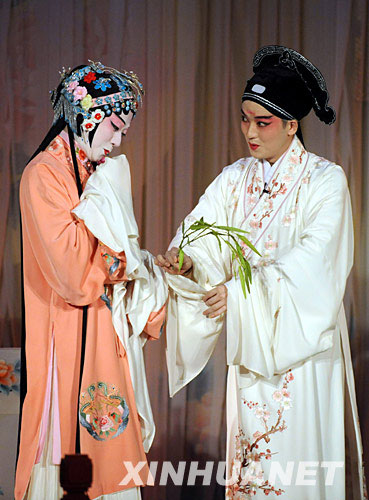
Japanese Kabuki artist Tamasaburo Bando (L) performs in Kunqu Opera "The Peony Pavilion" with Chinese performer Yu Jiulin at the Huguang Guild Hall in Beijing on Tuesday, May 6, 2008. [Photo: Xinhuanet]
Chinese and Japanese artists are currently performing a rare blend of their countries' quintessential art-forms in Beijing.
The classic Kunqu play, The Peony Pavilion, premiered at the Huguang Guild Hall on Tuesday. It featured veterans from the Suzhou Kunqu Opera House – Kunqu being the oldest form of Chinese opera - and revered Japanese Kabuki artist Tamasaburo Bando.
Bando, known for his female Kabuki roles, played the melancholic Du Liniang, who dies during his attempts to try and recollect a romantic dream.
"The most difficult part for me was to master the lyrics," the 58-year-old Bando, who speaks some Chinese, told the Beijing Evening News. To prepare for the role, he carefully studied the lip movements of former Du Liniang artist Zhang Jiqing by watching videos of his performances.
The hard work paid off. Zhang Jiqing was present on Tuesday's show and was blown away by Bando's performance, calling him "a great artist".
Bando says his personal idol is the late Mei Lanfang, the greatest Chinese opera artist of all time. He says Mei Lanfang's portrayal of Du Liniang left an everlasting impression on his mind. In the future, Bando hopes to see more male performers doing female Kunqu roles – which, according to him, is needed to ensure Mei Lanfang's legacy lasts forever.
"Coming to Beijing helped me realize my dream of tracing the footsteps of Mei Lanfang," Bando says. He recollects how thrilled he was to learn a decade ago when he first visited the Huguang Guild Hall, that Mei Lanfang once performed there.
In another screening of the show on Tuesday, Bando presented a Kabuki portrayal of ancient Chinese beauty Yang Guifei.
The show will continue every night at the Huguang Guild Hall until May 15.
(CRI May 7,2008)